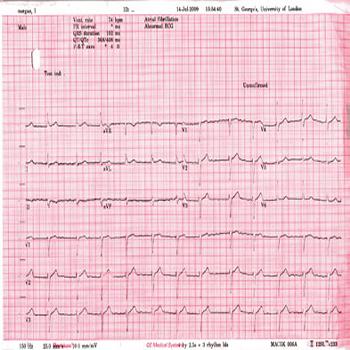Purpose: Assesses the heart's electrical activity to diagnose conditions like arrhythmias and heart attacks.
Procedure:
- Preparation: Patient lies down; electrodes are placed on the chest, arms, and legs.
- Recording: The EKG machine records the heart's electrical signals, producing a graph.
Interpretation: A healthcare professional analyzes the EKG for:
- Heart rate and rhythm.
- Chamber size and position.
- Signs of ischemia or infarction.
- Arrhythmias or conduction blocks.
Types of EKG:
- Resting EKG: Conducted at rest.
- Stress EKG: During exercise.
- Holter Monitor: Continuous recording for 24-48 hours.
Benefits: Quick, painless, noninvasive test with immediate results.
Safety: Generally safe; minimal risks involved.
Aftercare: No specific aftercare needed; patients can resume normal activities immediately.
The EKG with interpretation is essential for informed cardiac diagnosis and management.
Why would I need an EKG?
An EKG may be performed for several reasons, including:
Evaluating symptoms such as chest pain, shortness of breath, dizziness, palpitations, or fatigue that may indicate heart problems.
Diagnosing heart conditions: It helps identify heart rhythm disorders (arrhythmias), myocardial infarction (heart attack), heart block, and other structural abnormalities.
Monitoring existing heart conditions: Individuals with known heart diseases, such as coronary artery disease, atrial fibrillation, or congestive heart failure, may require regular EKGs to monitor their heart function.
Pre-operative evaluation: An EKG is sometimes done before surgery to check for heart conditions that may affect the procedure.
Routine screening: Certain individuals, such as athletes or those with a family history of heart disease, may undergo EKGs as part of routine health screening.
How do I prepare for an EKG?
Preparation for an EKG is minimal, but there are a few things you should consider:
Avoid applying lotions or oils: On the day of the test, avoid applying lotions, oils, or powders to your chest area, as they can interfere with the electrodes’ ability to adhere to the skin.
Wear comfortable, loose-fitting clothing: You may need to remove clothing from the upper body, so wearing easily removable or loose-fitting clothes can make the process easier.
Inform your healthcare provider of any medications: Some medications can affect heart rhythms, so it's important to let your healthcare provider know if you are taking any.
Relax: Being calm and relaxed during the test helps ensure accurate results, as stress or anxiety can affect your heart rate.
No special dietary restrictions or fasting is required for an EKG.
